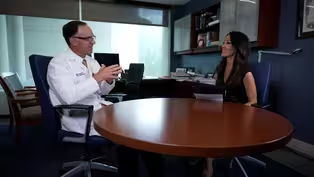Business | Life 360 with Kristi K.
Billing, Reimbursement, and Health Care Innovation - Lori Johnston
Clip: 9/19/2024 | 6m 8sVideo has Closed Captions
Kristi is joined by Lori Johnston from Paramount Health Care for Medical Mutual.
Here to help us understand the often-complex world of operations in health care insurance is Executive Vice President of Paramount Health Care for Medical Mutual, Lori Johnston.
Problems playing video? | Closed Captioning Feedback
Problems playing video? | Closed Captioning Feedback
Business | Life 360 with Kristi K. is a local public television program presented by WGTE
Business Life 360 with Kristi K. is made possible in part by KeyBank National Association Trustee for the Walter Terhune Memorial Fund and ProMedica Toledo Hospital, celebrating 150 years of serving our community.
Business | Life 360 with Kristi K.
Billing, Reimbursement, and Health Care Innovation - Lori Johnston
Clip: 9/19/2024 | 6m 8sVideo has Closed Captions
Here to help us understand the often-complex world of operations in health care insurance is Executive Vice President of Paramount Health Care for Medical Mutual, Lori Johnston.
Problems playing video? | Closed Captioning Feedback
How to Watch Business | Life 360 with Kristi K.
Business | Life 360 with Kristi K. is available to stream on pbs.org and the free PBS App, available on iPhone, Apple TV, Android TV, Android smartphones, Amazon Fire TV, Amazon Fire Tablet, Roku, Samsung Smart TV, and Vizio.
Providing Support for PBS.org
Learn Moreabout PBS online sponsorshipKrist K: Welcome back to the studio.
Billing, reimbursement and healthcare innovations don't always go hand in hand.
Here to help us understand the often complex world of operations in healthcare insurance, is executive vice president and president of Paramount Healthcare for Medical Mutual of Toledo.
Laurie Johnston Laurie has been in the health care insurance business for decades, and I can't think of anyone better to help us sor through some of the complexities facing consumers and patients in the insurance industry.
So, Laurie, welcome to Business Live 36.
Great to have you here.
Lori Johnston: Thank you.
Kristi K: It's great to be here.
Let's talk as we are on this show about some of the key innovations in healthcare that you are seeing, and specifically as those start to tie to billing and reimbursement.
Lori Johnston: Yes I think one of the challenges, you know, between those two topics, right, billing and reimbursement and innovation, one of the challenges have been that as researchers and physicians and, and pharmacy companies, as they try all new things, they're usually not always covered.
I think sometime insurance gets a bad name for, oh, they don't want to pay for anything, which really isn't true, but they really do rely on, a lot of the government recommendations and a lot of the scientific evidence.
And so many times things aren't reimbursed from a insurance perspective of until they've really gone through all of the testing and, and really been proven to be effective.
And so I think that's what's, you know, makes it such a hard position, because if you're a patient and there's something new, you can trial, you want to do whatever you can do and trial it, and then you find ou your insurance doesn't cover it.
And that becomes very frustrating.
And there's also challenges as it comes to things like pharmaceuticals as well.
Kristi K: I want to talk a little bit about that.
So a new drug comes on the market.
We all see the TV spots on those and hear them on the radio.
New drugs are on the market.
It sounds like something that would help us, but how do we know if it's going to be covered?
And do we have to skip a meal so that we can pay for our medications?
Lori Johnston: Yes.
Many of the, man of the new drugs on the market, you said it well are seen on TV, you know, long before there may be added to the formulary of your employer's health insurance.
And, and so I think one of the things that's challenging is that sometimes those drugs then are used for something other than their original intended purpose.
I think that that's an area that gets frustrating for, for people to understand well why it is covered, why isn't it covered for me?
And, and really the, you really have to understand exactly how your plan works and kind of what the true science says aroun what the drug was created for.
Kristi K: So if you are at a corporation and your company does offer certain drugs on the formulary of choice and some of the procedures, then you can get that procedures that is that kind of theoretically correct?
Lori Johnston: It is theoretically correct.
I think, you know, it's it's different for commercial insurance than it is for Medicare.
So for Medicare, the center for Medicare Services, CMS, they se what is allowable to be covered for Medicare beneficiaries when it's a commercial, health insurer, the employer really dictates what they want to cover o behalf of their employee group.
Kristi K: One of the segments that's on this show is we're talkin a little bit more about prostate cancer advancement and large prostate advancements and also, deep brain stimulation for those with Parkinson's disease and essential tremors.
So if someone is watchin this show, they're seeing those, those wonderful, innovative technologies that may be game changers for them.
How does a patient meet sort of that intersection between provider access and coverage in terms of health care?
Lori Johnston: Well, this is where it gets very tricky for a member, because first off, I think that sometimes as new procedures like those come out and come to the market, they may be in a given community only offered by certain physicians.
And so s the first thing is to understand is that physician even in your covered network.
And so some of that's understanding your plan and what's covered.
And then if it trul is medically necessary to do it, sometimes you can get coverage out of network.
If they're, for example, the only one that that does that certain, thing.
Kristi: And if they hear a procedure like the prostate enlargement procedure, we just heard about it on the show.
What should they do?
Should they say, okay, I'm going to assume it's not covered, s I'm not going to call on that.
Should they go ahead and make a call to their member services department?
How should they proceed?
Us.
Lori Johnston: So two ways.
One, I think many times the physician's office has got a lot of experience and understanding, but you got to appreciate they deal with a lot of insurance companies.
But then also I think that the, the actual patient should call and ask and if it's not covered to understand why it's not from a patient's perspective, they really need to advocate for themselves, and they need to not be afraid to push, you know, pus back to the insurance company, push back to the physician, and just to make sure.
And so I think always asking and not just assuming is the right way to go.
Laurie Johnston, thank you for being with us today and for enlightening us to all of these very complex issues facing us today.
Kristi K: Thank you.
Laurie Johnston has a wealth of experience and a breadth of knowledge in this often confusing healthcare insurance world.
Thanks again to Laurie for the insight and for all she does to help consumers and members get access to innovative health care, and to navigate reimbursement for these new and impactful, even life changing health care innovations.
Healthcare Innovation - Dr. Michael Ellis
Video has Closed Captions
Clip: 9/19/2024 | 4m 10s | Kristi joins Dr. Michael Ellis to discuss trends and innovation in medicine. (4m 10s)
Innovation in Parkinson's Treatment
Video has Closed Captions
Clip: 9/19/2024 | 7m 40s | Kristi speaks with with two renown experts in neuroscience and neurology. (7m 40s)
Prostate Health and Innovation- Dr. Puneet Sindhwani
Video has Closed Captions
Clip: 9/19/2024 | 5m 54s | Kristi learns about prostate health and innovation at the University of Toledo Medical Center. (5m 54s)
Providing Support for PBS.org
Learn Moreabout PBS online sponsorship
- News and Public Affairs

Top journalists deliver compelling original analysis of the hour's headlines.

- News and Public Affairs

FRONTLINE is investigative journalism that questions, explains and changes our world.












Support for PBS provided by:
Business | Life 360 with Kristi K. is a local public television program presented by WGTE
Business Life 360 with Kristi K. is made possible in part by KeyBank National Association Trustee for the Walter Terhune Memorial Fund and ProMedica Toledo Hospital, celebrating 150 years of serving our community.


